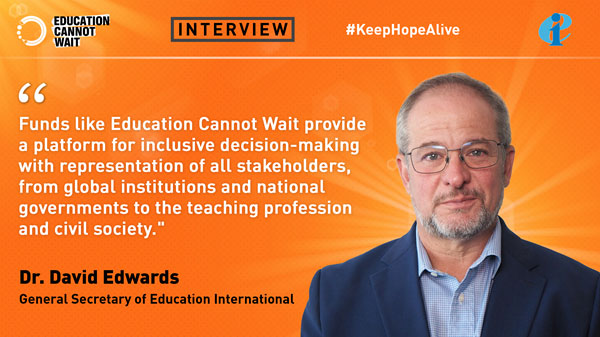Dr. David Edwards Urges Global Action to Address Teacher Shortage NOW

URGENT UPDATE: Dr. David Edwards, General Secretary of Education International, has issued a critical call for immediate global action to address the alarming shortage of teachers worldwide. In an exclusive interview, he highlights that by 2030, an estimated 44 million additional primary and secondary teachers will be needed to ensure quality education for all children, particularly in crisis settings.
As humanitarian crises escalate, the need for trained and supported teachers becomes increasingly urgent. Dr. Edwards emphasizes that millions of vulnerable children are being denied access to education, stating, “What is education without teachers?” He warns that without immediate investment in teacher recruitment and training, the future of millions hangs in the balance.
During his tenure since 2018, Dr. Edwards has championed the role of Education International within Education Cannot Wait (ECW), a fund that has already reached over 14 million children across 178 countries. He argues that multilateral funding mechanisms are essential to coordinate and sustain educational support in emergencies, reducing waste and ensuring that aid meets local needs.
Dr. Edwards stresses the dire situation faced by teachers in crisis regions like South Sudan and Yemen, where delayed salary payments have left educators struggling to support their families. “Teachers on government payroll in South Sudan have not been paid in over a year,” he reveals. He warns that this financial instability drives teachers away from the profession, further disrupting education for children in need.
The emotional toll on educators is profound. Dr. Edwards recalls the story of South Sudanese refugee teacher Stella Oryang Aloyo, who poignantly asked, “What is education without teachers?” He underscores that teachers are not just critical to delivering lessons; they provide emotional support and stability in the lives of children who often face trauma and displacement.
To tackle this escalating crisis, Dr. Edwards calls for flexible, multi-year funding mechanisms that prioritize teacher compensation in both emergency responses and long-term recovery plans. He asserts, “If we are serious about ending the global teacher shortage, we must ensure that every teacher, especially in crisis settings, is paid fully, fairly, and on time.”
As the world grapples with fast-evolving humanitarian challenges, Dr. Edwards advocates for empowering teachers and involving them in decision-making processes. “Coordination among humanitarian and development actors is key,” he states, urging that teachers should be integral to education response strategies.
Dr. Edwards also emphasizes that education systems must adapt to rapidly changing technologies while maintaining focus on the human elements of teaching. He highlights the importance of teacher leadership, stating, “Digital technologies will never replace the human connection and emotional support that teachers provide.”
The commitment to localizing education delivery models is another focal point for Dr. Edwards. He insists that global organizations must shift power to local actors, enhancing their capacity to lead educational responses. This approach ensures that education initiatives are contextually relevant and reflective of local needs.
As Dr. Edwards concludes, the time for action is NOW. He calls on governments and global organizations to prioritize investments in education and teachers, particularly in crisis settings. The future of millions depends on it.
This urgent call to action underscores the critical need for immediate global investment in education, ensuring every child has access to quality teaching and a brighter future. The world must respond swiftly to safeguard the educational rights of children in the most vulnerable situations.
Stay tuned for more developments on this pressing issue as global leaders and organizations respond to Dr. Edwards’ urgent plea.






